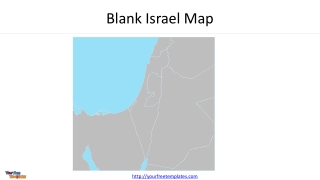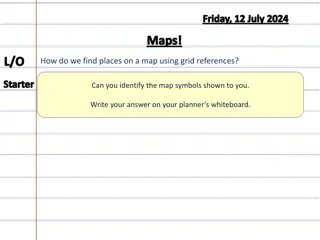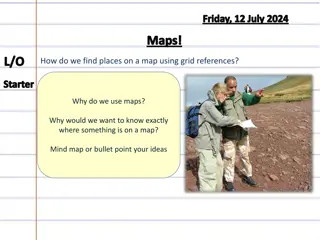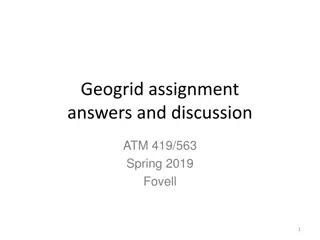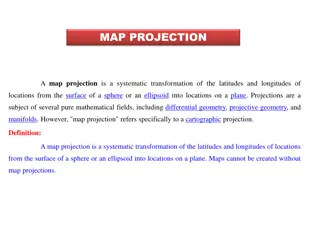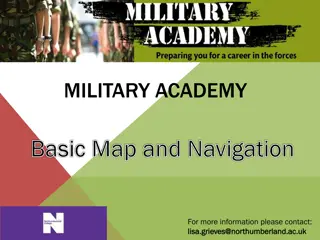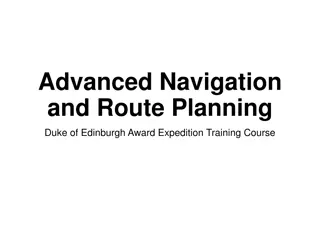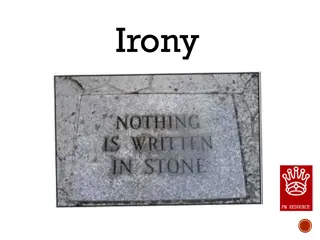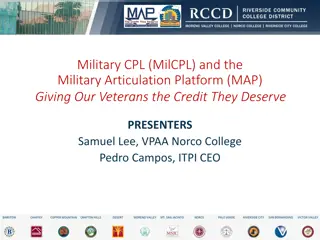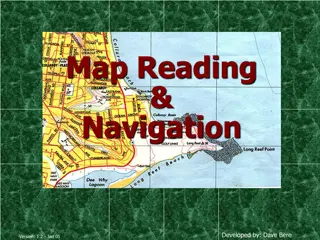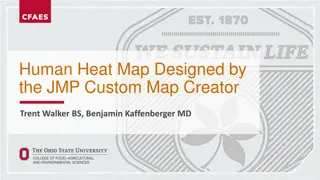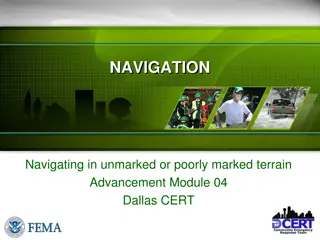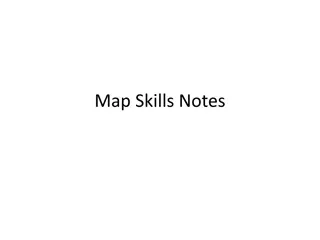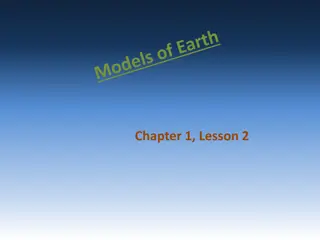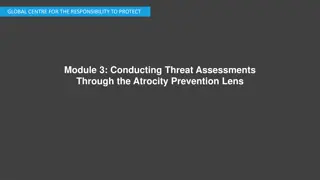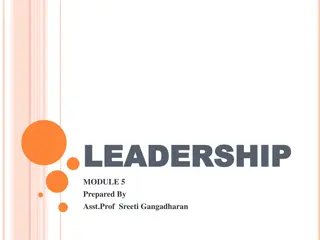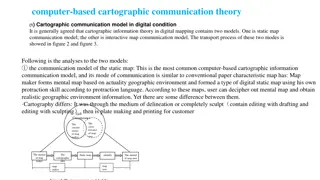Blank Israel Map
Explore a detailed map of Israel and Palestine, highlighting countries, territories, capitals, and major cities. The map includes Lebanon, Syria, Egypt, Jordan, Iraq, Saudi Arabia, Mediterranean Sea, Red Sea, and more.
0 views • 4 slides
Impact of Situational Leadership Readiness in Elementary School
The study explores how situational leadership styles, specifically in the dimensions of Selling, Telling, Participating, and Delegating, impact elementary school leadership. Research conducted at an elementary school in Ciniru, Kuningan, relied on qualitative methods including observation, interview
1 views • 10 slides
Mastering Map Grid References for Accurate Location Identification
Learn how to find places on a map using grid references. Discover how to identify map symbols and determine accurate six-figure grid references. Follow step-by-step guidance to pinpoint locations with precision on maps. Enhance your mapping skills and boost your navigational expertise efficiently.
0 views • 18 slides
Understanding Grid References on Maps
Learn how to find places on a map using grid references, the importance of knowing exact locations on a map, and practice identifying 4-figure grid references independently. Discover how grids on maps help in quickly locating places and memorize the process with the mnemonic "Along the corridor and
0 views • 9 slides
Understanding Regional Map Projections and Plotting Using WRF-ARW
Explore different map projections such as Lambert, Polar, Mercator, and Lat-lon in the context of WRF-ARW model. Learn about specifying grid spacing, map factors, and pole location adjustments. Discover how to create plots using Python with wrf-python for regional domains.
0 views • 13 slides
Understanding Map Projections: Types and Applications
Map projection is a systematic transformation of latitudes and longitudes from a curved surface to a flat plane. There are various classifications based on construction methods, tangent surface position, view point of light, and qualities like equal area and equi-distance. Zenithal Polar Equidistanc
0 views • 9 slides
Military Academy Map and Navigation Presentation
This presentation introduces basic map reading and navigation skills essential for Military Academy students. It covers various types of maps, map symbols, measuring distance, and understanding topographical features like physical and man-made elements. Navigation is highlighted as a critical skill
0 views • 18 slides
Understanding Language Teaching Syllabus: Integration, Theory, and Approaches
Language Teaching Syllabus involves the integration of subject matter and linguistic elements, guided by theories of language and learning. Various approaches like Grammatical, Situational, Communicative, and Analytic are used to structure syllabi. Breaking language into parts aids in sequential lea
1 views • 28 slides
Advanced Navigation and Route Planning for Duke of Edinburgh Award Expedition Training Course
Learn advanced map and compass skills essential for Duke of Edinburgh Silver Award expeditions. Discover how to read topographical maps, navigate using contours, understand map scale, and interpret map symbols to enhance your outdoor experience.
0 views • 15 slides
Understanding Irony in Verbal, Dramatic, and Situational Contexts
Explore the nuances of verbal, dramatic, and situational irony through examples and explanations. Verbal irony involves saying something different from what is meant, often using humor like puns. Dramatic irony occurs when the audience knows something the characters don't, creating suspense. Situati
0 views • 12 slides
Understanding Hospital Bed Turnover and Situational Leadership Characteristics
Hospital bed turnover is crucial for assessing hospital productivity, with turnover interval (TOI) indicating the average period a bed remains empty. Bed turnover rate (BTR) measures patient care efficiency. Situational leadership, adaptable to group needs, involves directing and coaching based on g
2 views • 7 slides
Psychometric Tests Overview: MAP, SPM, Observation Test
Explore three different psychometric tests - Multi-Dimensional Assessment of Personality (MAP), Standard Progressive Matrices (SPM), and Observation Test. MAP assesses personality dimensions, SPM measures intelligence through abstract reasoning, and the Observation Test evaluates your power of obser
4 views • 14 slides
Exploring Situational Leadership and Mindset in Educational Leadership
This educational session delves into Situational Leadership, utilizing the Hersey-Blanchard framework, to tailor leadership approaches based on the mindset, skill, and will of educators. It also discusses growth versus fixed mindsets and includes a practical mindset vignette for application. Partici
0 views • 13 slides
WaferMap Configuration Guide for Graph Builder
This guide provides detailed instructions on setting up WaferMap in Graph Builder, preparing map files, distributing and installing map files, creating wafer maps by cube/sub-chunk/chunk, using map shapes as background, and accessing a custom map creator tool.
0 views • 6 slides
Empowering Veterans Through the MAP Initiative
The Military Articulation Platform (MAP) aims to give veterans the credit they deserve by articulating college courses with ACE credit recommendations. This initiative allows veterans to receive up to one year of credit, enabling them to achieve their educational goals and access high-wage jobs. Thr
5 views • 35 slides
Essential Guide to Map Reading and Navigation Techniques
Discover the fundamentals of map reading and navigation developed by Dave Bere. Explore various types of maps used within SES, learn how to use different maps effectively, and understand the importance of map care and folding. From understanding marginal information to mastering compasses and bearin
0 views • 53 slides
Enhancing Defensive Skills and Situational Awareness in Hockey
Enhancing defensive skills and situational play in hockey is crucial for success. All team members can contribute to team defense by developing skills like skating, body checking, understanding the ice surface defensively, read and react abilities, and effective communication. Proper skating skills
3 views • 45 slides
Exploration of Human Heat Map Designed by JMP Custom Map Creator
Delve into the intricate human heat map designed by Trent Walker BS and Benjamin Kaffenberger MD from The Ohio State University College of Food, Agricultural, and Environmental Sciences. Uncover the detailed visual representation highlighting key areas of interest.
0 views • 21 slides
Understanding Irony: Verbal, Dramatic, and Situational Examples
Dive into the world of irony with examples of verbal, dramatic, and situational irony explained through scenarios like sarcastic comments, horror movie twists, and unexpected encounters. Explore how irony adds layers of meaning and depth to storytelling, from characters knowing more than others to o
0 views • 10 slides
Proposal for Dynamic Multi-AP Coordination in IEEE 802.11-23
This proposal focuses on enhancing the reliability of multi-AP coordination in IEEE 802.11-23 through the formation and management of MAP (Multi-AP) groups. It discusses the limitations of the current setup and suggests a dynamic approach where multiple APs can form MAP groups flexibly. The document
0 views • 11 slides
Introduction to Pig Latin for Data Processing in Hadoop Stack
Pig Latin is a dataflow language and execution system that simplifies composing workflows of multiple Map-Reduce jobs. This system allows chaining together multiple Map-Reduce runs with compact statements akin to SQL, optimizing the order of operations for efficiency. Alongside Pig Latin, the Hadoop
0 views • 20 slides
Navigating Techniques without a Map: CERT Training Guide
Gain essential navigation skills for unmarked or poorly marked terrains through this module. Learn methods for navigating without a map, using a map effectively, and preparing mentally for getting lost. Discover the importance of carrying a compass, knife, and matches for CERT team members. Master t
0 views • 37 slides
Understanding Attribution Theory: Exploring Dispositional vs. Situational Attribution
Attribution theory examines how people explain behavior and events by analyzing internal vs. external causes. Heider's influential ideas on dispositional vs. situational attributions are discussed. Dispositional attribution focuses on internal characteristics, while situational attribution relates b
0 views • 14 slides
Understanding Basic Map Skills and Terms
Explore the essential map skills and terms such as map key/legend, compass rose, scale, latitude, longitude, Equator, Prime Meridian, hemispheres, and more to enhance your map reading and interpretation skills effectively.
0 views • 7 slides
Understanding Map Concepts: An Overview
Exploring essential map-related terms and concepts such as map projection, hemisphere, latitude, longitude, scale, equator, prime meridian, map symbol, and globe. Enhance your understanding of how maps represent Earth's surface and the key elements involved in cartography.
0 views • 14 slides
Replicating Milgram's Obedience Study: Burger's Contemporary Research
Burger's 2009 study aimed to partially replicate Milgram's famous obedience experiments to explore if obedience levels have changed over time, focusing on the influence of situational factors. Using a similar setup, Burger found that individuals still exhibit high obedience rates, challenging assump
0 views • 44 slides
Conducting Threat Assessments Through the Atrocity Prevention Lens
This module from the GLOBAL CENTRE FOR THE RESPONSIBILITY TO PROTECT focuses on conducting threat assessments through an atrocity prevention lens. It covers risk identification, situational awareness in field settings, information collection methods, addressing vulnerabilities of women and children,
0 views • 20 slides
Messy Situational Map Template with Suggestions for Use
This SA template provides a messy situational map template along with suggestions for use. The initial map should be done by hand on a large piece of paper to allow for quick adjustments and capturing thoughts. The template includes an abstract map and a customizable version for creating more readab
0 views • 4 slides
Various Strategy Maps and Their Components
This content discusses different types of strategy maps including the Balanced Scorecard, Classic Kaplan/Norton Strategy Map, Generic Example Strategy Map, and Basic Strategy Map Background. Each map highlights different perspectives such as financial, customer, internal, and learning & growth, alon
0 views • 22 slides
Comprehensive Overview of Leadership Theories and Styles
Leadership encompasses the ability to influence a group towards achieving goals by knowing oneself, communicating vision, building trust, and taking effective action. Various leadership styles include Autocratic, Democratic, Free-Rein, and Paternalistic, each with distinct decision-making approaches
0 views • 19 slides
Understanding Assessment Centres: Psychometric Tests, Situational Judgement, and More
Assessment centres often include psychometric tests, ability testing, and situational judgement assessments to evaluate candidates. These tests help employers understand your personality, behaviours, decision-making skills, and ability to work in different scenarios. By participating in these assess
0 views • 25 slides
Leadership Insights: Traits, Differences, and Framework
Leadership involves guiding others towards shared goals through vision, inspiration, knowledge, and resilience. It distinguishes from management in focus and approach. Analyzing leadership involves assessing leader traits, situational factors, and follower dynamics. The leadership framework comprise
0 views • 36 slides
Situational and Organizational Factors in Sexual Abuse by Catholic Priests
The content discusses situational and organizational factors related to sexual abuse involving seminary students, faculty, parishes, and dioceses. It covers settings and circumstances of sexual abuse, including locations where victims first encountered abusive priests. Data reports from the United S
0 views • 28 slides
Understanding Situational Factors in Sexual Abuse by Catholic Priests
This module delves into the situational and organizational factors influencing sexual abuse of minors by Catholic priests, exploring types of offenders, grooming techniques, and prevention strategies for parishes and dioceses. It highlights key data reports on sexual abuse cases, examines settings a
0 views • 49 slides
The Evolution of Cartographic Communication Theory in the Digital Age
Cartographic communication theory in digital mapping involves two models: the static map communication model and the interactive map communication model. The static map model follows traditional map-making methods adapted to digital tools, while the interactive map model leverages user feedback to r
0 views • 8 slides
Understanding Situational Crime Prevention Strategies
Situational crime prevention strategies aim to reduce crime by altering environmental conditions, influencing offender decisions, and targeting crime opportunities. Primary prevention focuses on modifying physical and social environments, while secondary prevention aims to identify potential offende
1 views • 31 slides
Understanding Sets, Maps, and Map Methods
Explore the concepts of sets, maps, and map methods in programming, focusing on efficient operations like adding, removing, and searching for values. Sets allow unique values with no duplicates, while maps hold key-value pairs like a dictionary. Map methods provide functions for manipulating mapping
0 views • 5 slides
Understanding Irony: Types, Purpose, and Examples
Irony is about expectations and contrast between reality and what is being said. It can add interest, depth, suspense, and humor to texts. The three types of irony are verbal, dramatic, and situational, each serving a unique purpose to engage the audience. Examples from popular stories like Beauty a
0 views • 12 slides
Introduction to Spark in The Hadoop Stack
Introduction to Spark, a high-performance in-memory data analysis system layered on top of Hadoop to overcome the limitations of the Map-Reduce paradigm. It discusses the importance of Spark in addressing the expressive limitations of Hadoop's Map-Reduce, enabling algorithms that are not easily expr
0 views • 16 slides
Enhancing Situational Awareness for Home Visit Safety
Situational awareness is crucial for observing and being attentive to your surroundings to prevent accidents and errors. Understanding different levels of situational awareness, from a relaxed alert state to an active threat response, can significantly improve safety and decision-making in everyday
0 views • 14 slides
